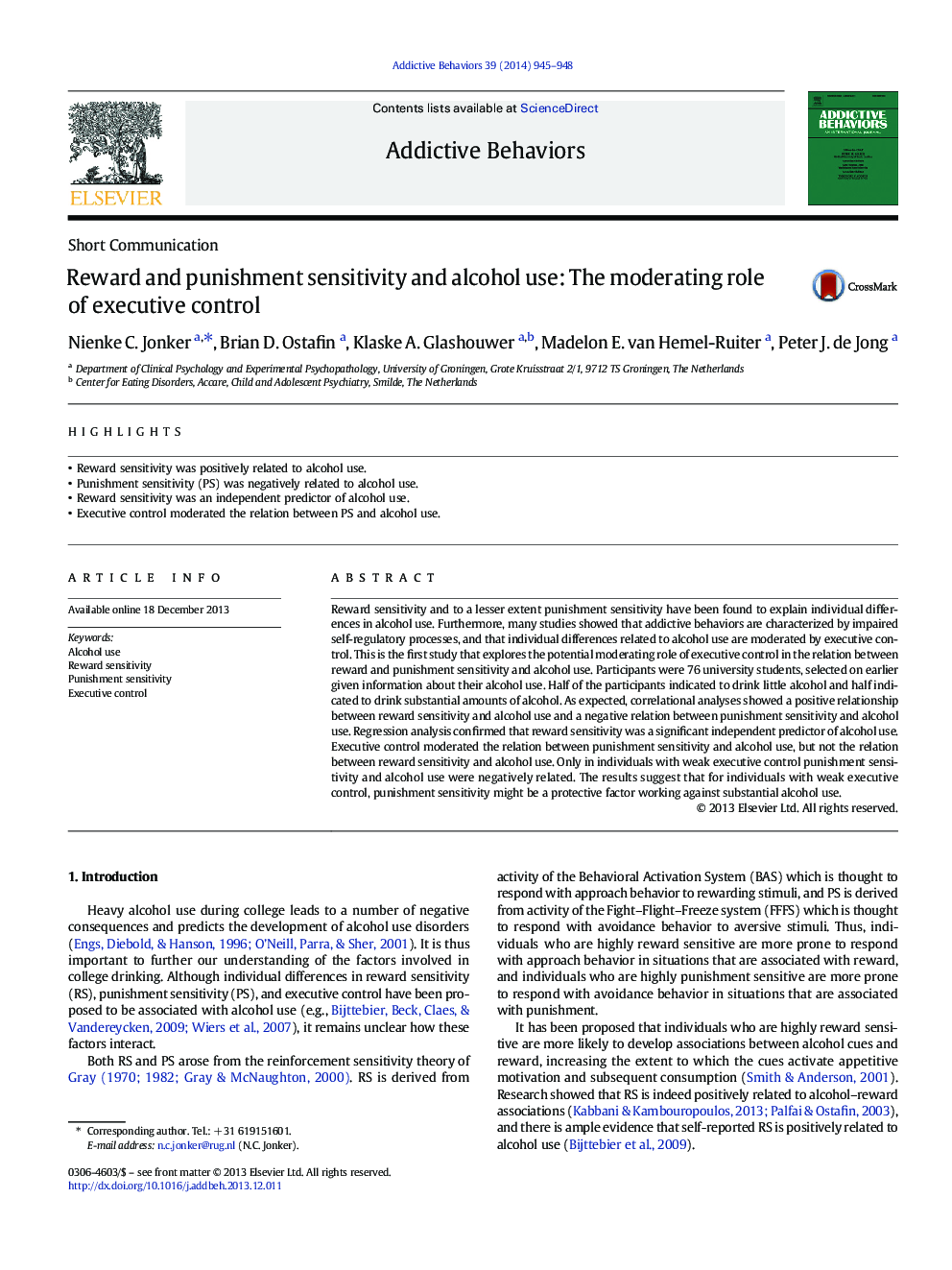| کد مقاله | کد نشریه | سال انتشار | مقاله انگلیسی | نسخه تمام متن |
|---|---|---|---|---|
| 10443257 | 915347 | 2014 | 4 صفحه PDF | دانلود رایگان |
عنوان انگلیسی مقاله ISI
Reward and punishment sensitivity and alcohol use: The moderating role of executive control
ترجمه فارسی عنوان
حساسیت پاداش و مجازات و استفاده از الکل: نقش مستمر کنترل اجرایی
دانلود مقاله + سفارش ترجمه
دانلود مقاله ISI انگلیسی
رایگان برای ایرانیان
کلمات کلیدی
مصرف الکل، حساسیت پاداش، حساسیت مجازات، کنترل اجرایی،
ترجمه چکیده
حساسیت به پاداش و حساسیت تنفیذ کمتری یافته است تا اختلافات فردی در مصرف الکل را توضیح دهد. علاوه بر این، مطالعات بسیاری نشان داده است که رفتارهای اعتیادآور با اختلال در فرآیندهای خودمراقبت مشخص شده است و تفاوتهای فردی مربوط به مصرف الکل توسط کنترل اجرایی تعدیل شده است. این اولین مطالعه ای است که به بررسی نقش احتمالی نظارت اجرایی در رابطه بین حساسیت پاداش و مجازات و مصرف الکل می پردازد. شرکت کنندگان 76 دانشجوی دانشگاه بودند که بر اساس اطلاعات پیشین در مورد مصرف الکل خود انتخاب شده بودند. نیمی از شرکت کنندگان نوشیدنی الکل را نوشیدند و نیمی از آنها مقدار زیادی الکل مصرف کردند. همانطور که انتظار می رفت، تجزیه و تحلیل همبستگی نشان داد که رابطه مثبت بین حساسیت پاداش و مصرف الکل و رابطه منفی بین حساسیت مجاز و مصرف الکل وجود دارد. تجزیه و تحلیل رگرسیون نشان داد که حساسیت پاداش یک پیشگویی مستقل از مصرف الکل است. کنترل اجرایی رابطه بین حساسیت مجازات و مصرف الکل را تعدیل می کند، اما رابطه بین حساسیت پاداش و مصرف الکل رابطه ای ندارد. فقط در افراد دارای مجازات اجرایی ضعیف، حساسیت و مصرف الکل به طور منفی مرتبط بود. نتایج نشان می دهد که برای افرادی که دارای کنترل اجرایی ضعیف هستند، حساسیت مجاز ممکن است یک عامل محافظ در برابر مصرف الکل باشد.
موضوعات مرتبط
علوم زیستی و بیوفناوری
علم عصب شناسی
علوم اعصاب رفتاری
چکیده انگلیسی
Reward sensitivity and to a lesser extent punishment sensitivity have been found to explain individual differences in alcohol use. Furthermore, many studies showed that addictive behaviors are characterized by impaired self-regulatory processes, and that individual differences related to alcohol use are moderated by executive control. This is the first study that explores the potential moderating role of executive control in the relation between reward and punishment sensitivity and alcohol use. Participants were 76 university students, selected on earlier given information about their alcohol use. Half of the participants indicated to drink little alcohol and half indicated to drink substantial amounts of alcohol. As expected, correlational analyses showed a positive relationship between reward sensitivity and alcohol use and a negative relation between punishment sensitivity and alcohol use. Regression analysis confirmed that reward sensitivity was a significant independent predictor of alcohol use. Executive control moderated the relation between punishment sensitivity and alcohol use, but not the relation between reward sensitivity and alcohol use. Only in individuals with weak executive control punishment sensitivity and alcohol use were negatively related. The results suggest that for individuals with weak executive control, punishment sensitivity might be a protective factor working against substantial alcohol use.
ناشر
Database: Elsevier - ScienceDirect (ساینس دایرکت)
Journal: Addictive Behaviors - Volume 39, Issue 5, May 2014, Pages 945-948
Journal: Addictive Behaviors - Volume 39, Issue 5, May 2014, Pages 945-948
نویسندگان
Nienke C. Jonker, Brian D. Ostafin, Klaske A. Glashouwer, Madelon E. van Hemel-Ruiter, Peter J. de Jong,
